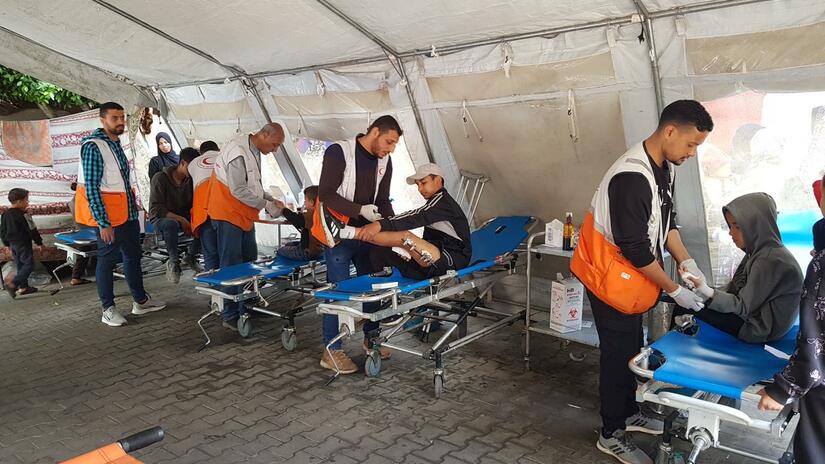“I wake up early at seven in the morning to attend to the family's needs, then head to the nearby market, which is one kilometer away. I search for something to feed my hungry children.”
This is how a typical day starts for Youssef Khoder, a Palestine Red Crescent volunteer from northern Gaza. Youssef comes from a family of volunteers. His mother is an obstetrics nurse, his brother Mahmoud and Ibrahim are also both nurses.
“We have been working at the PRCS medical point in Jabalia since its establishment,” he says. “We were displaced and had to move to a shelter center, but now the situation has changed, and we have returned to our homes.”
After getting food at the market, Youssef and his wife start a fire to prepare food for their young children. The eldest daughter, Ayloul, is 6 years old. Mohammed is 4, and Ghaith is 2. Then Youssef is off to meet his brothers at the medical point in Jabalia.
“We walk 2 kilometers back and forth every day to reach the medical point where we volunteer,” he says. “We carry out our work because it is our humanitarian duty, continuing to serve our people in northern Gaza.”

At a medical point in Jabalia, Palestine Red Crescent Society volunteers attend to patients.
Photo: Palestine Red Crescent Society
A vital point for community health amid conflict
The medical point consists of a large tent, inside which there are about a dozen rolling hospital gurneys or beds. The medical post in Jabalia, in the Northern Gaza Strip, has remained operational and provided medical and health services to thousands of affected people even when key hospitals went out of service; it continues to provide services despite the shortage of medicine.
While his brothers attend to patients, Youssef takes photos as part of his responsibilities documenting the work of his Palestine Red Crescent colleagues. This is important role in documenting the humanitarian needs as well as the reporting to the world what the Red Crescent is doing to try and address those needs.
This is not as easy as it may seem. With power outages and damaged communications infrastructure, the simple act of sending the photographs to headquarters is not so simple.
"After the afternoon prayer, I walk one kilometer to a high-altitude location so I can catch a signal and gain internet access. I spend half an hour sending files to the administration before returning to the medical point. We spend an hour with colleagues before heading back, sometimes stopping by the market to get some food for suhoor and for the next day. However, food is scarce and the prices are very high."
During Ramadan, all this was done while fasting from sun up to sun down. After work, they would return home before breaking their fast (iftar). "My family and I sit together. I break my fast with them, pray the Maghrib prayer, have tea, and then return to the medical point on foot. I work for a few hours before coming home late.
Concerning food scarcity, it’s like we have been fasting for 6 months, so it’s not just during Ramadan.
We continue to work with even greater determination than before, and we pray that we remain able to serve the people, and that Gaza’s dark days will soon pass.”





